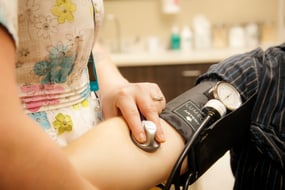Millions of Americans are affected by hypertension. What does that mean for you? Even if you have heard of hypertension before, you may have questions about what it is, what its effects are, and the simple and effective steps you can take to prevent it.
Hypertension is consistently elevated blood pressure — when the pressure inside blood vessels is higher than what is considered normal. This can cause serious health consequences like heart attacks, stroke, kidney damage, and more. In fact, one in three adults is at risk for a heart attack or stroke. And yet most people who have hypertension are unaware of it until they visit their health provider for an unrelated reason and discover that their blood pressure is elevated.
What are the consequences of hypertension?
Hypertension can be caused by excess fluid inside the blood vessels or by a buildup of plaque that consists of fat, cholesterol, calcium, and other substances found in the blood. It can also be caused when the walls of blood vessels become stiff.
When the walls of the blood vessels are under increased pressure, it can cause damage that increases the risk of heart attack, stroke, and peripheral artery disease. The pressure can also burst blood vessels, called aneurysms — most commonly in the brain or the aorta (the main artery that exits the heart).
Hypertension in small blood vessels in the eyes can cause visual problems and blindness. In small blood vessels in the kidneys, it can lead to kidney disease and failure.
Who is at risk for hypertension?
It’s important to understand that there are different factors that contribute to your risk for hypertension. Some risk factors are not controllable but many are.
Risk factors that are not controllable include:
- Age: The risk of high blood pressure tends to increase with age. Men get high blood pressure more when they’re less than 65 years old, and women get it more often when they’re older than 65.
- Genetics: Having family members with hypertension increases the risk of developing high blood pressure.
- Race: Some groups are more likely to experience hypertension. For example, African Americans get high blood pressure more than any other racial group

Risk factors that can be controlled include:
- Excess weight or obesity
- Smoking
- A lack of physical activity
- An unhealthy diet including too much salt
- High consumption of alcohol
- High cholesterol
- Diabetes
- Untreated sleep apnea
- Unmanaged stress
How can you reduce or prevent hypertension?
Here are some simple lifestyle changes that you can make that are highly effective at controlling blood pressure and preventing hypertension. If you want to pursue any of these changes, talk to your provider and your health coach — they’re always ready to help you get started and work with you to customize a prevention health care plan that supports any healthy change you choose to make.
 Check your blood pressure regularly
Check your blood pressure regularly
Start checking your blood pressure at least once a year (it’s ideal to start early when you’re in your 20s and 30s). If you have a family history of high blood pressure, it’s especially important to make sure that your blood pressure is not elevating over time.
 Maintain a healthy weight
Maintain a healthy weight
For people who are currently overweight or obese, weight maintenance is a key way to reduce risk.
 Increase your physical activity
Increase your physical activity
Adding 30 minutes of some kind of aerobic activity to your daily routine will help you maintain a healthy blood pressure.
 Make healthy food choices
Make healthy food choices
Try to limit your intake of foods that contain a lot of sodium and saturated fats. Plant-based, whole food diets can also help reduce your risk of hypertension.
 Stop smoking
Stop smoking
Smoking contributes to calcification of the arteries, which increases a person’s risk of developing high blood pressure.
 Keep alcohol consumption moderate
Keep alcohol consumption moderate
It’s a good idea to limit your alcohol consumption to no more than one to two drinks per day.
 Make time for sleep and relaxation
Make time for sleep and relaxation
Stress management and plenty of sleep are essential to keeping your blood pressure at a healthy level. Studies have shown that taking 10 minutes of deep breaths every day is often helpful in lowering a person’s blood pressure since it relaxes the nervous system and can help widen narrowed blood vessels.
When to talk to your provider about hypertension
Some of the warning signs of hypertension include blurred vision, headaches, and persistent feelings of fatigue. If you notice heart palpitations or feel like your heart is pounding, that may also be cause for concern.
But remember: Even if you haven’t experienced any physical symptoms, it’s still essential to get your blood pressure checked regularly and have a conversation with your provider about how you can avoid hypertension. Regardless of your genetic and lifestyle risk factors, you and your provider should work together to come up with a plan to maintain a healthy blood pressure — so you can feel your best and have peace of mind.
Ready for the next step? Schedule your annual whole health visit today.
Sign up
Join our email list to receive the latest open positions, Vera Careers news, and more.





